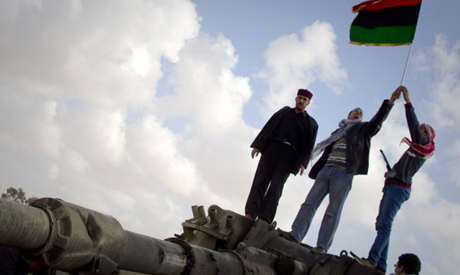
Libyan men celebrates on a destroyed tank belonging to the forces of Muammar Gaddafi in the outskirts of Benghazi, eastern Libya, Sunday, 20 March 2011. (AP)
Operation Odyssey Dawn and the launch of the so-called “limited military action” on the Gaddafi regime in Libya are proceeding with official regional approval and an uneasy popular consent.
As Libya’s bloody situation continued to deteriorate with Muammar Gaddafi’s stubborn cling to power, the Arab world is served a reminder of the invasion of Iraq. The situation, however, is quite different from how it was then, and so are popular sentiments.
Unlike with Iraq, the United States insisted that regional acceptance was imperative for any military action and the idea of enforcing a no-fly zone only gained traction following the Arab League’s consensus.
The intervention in this case is undoubtedly under UN auspices, and, therefore, legitimate under international law. But it is the involvement of NATO nations instead of local African or Middle Eastern forces that is stirring old sentiments.
French planes were the first to sweep over Libya targeting tanks and vehicles. France was soon joined by the United States and Britain.
Ahmed Bahaa El Din Shaaban, a founding member of the Kefaya opposition movement in Egypt and a political writer, nevertheless condemns the intervention that “threatens a sister Arab country.”
He argues the intervention would complicate Libya's future and create numerous problems for its people as well being an opportunity for the implementation of a United States agenda in the region.
Were the intervention lead by Arab countries, it would not have been any less problematic, according to Shaaban. He implied that the Arabs’ reluctance to do so, instead leaving it to the ‘international community’, was to avoid Arab on Arab bloodshed.
“Gaddafi cornered them, he shut out all other alternatives,” he declared.
According to Mayada Shawky, a teaching assistant in the British University in Egypt, the Arab states could not go as far as intervening against Gaddafi’s regime because it would raise questions regarding their own.
“They just ‘condemned’ Gaddafi’s violence, but no one was willing to take action against him,” says Shawky. “No one would make such a statement against Gaddafi because it would open their very own can of worms.”
“They [the Arab states] did not do anything to Al Bashir for the exact same reason,” she continued in reference to Sudan’s president Omar Al Bashir, for whom a warrant has been issued by the International Criminal Court for committing war crimes.
Shawky does not consider the military action in Libya an invasion with the absence of ground troops giving her some comfort.
“As long as they only attack Gaddafi’s military targets and as long as there are no ground troops they will leave once the threat is over,” she said. “It’s become so bad in Libya; I do not see how this could make it worse.”
Mostafa El-Barbari, a young graduate, agrees. “As long as there are no ground troops, it is acceptable, but someone had to intervene.”
He noted that Arab states could not intervene because they were either trying to prevent a revolution in their own countries or embarking upon one.
Following the beginning of the military campaign against Muammar Gaddafi, he broadcasted an audio message on Libya’s state TV saying, among other things, that “all tyrants fall under the feet of their people,” referring to Hitler and Mussolini.
There were some international concerns regarding the UN-backed intervention as well.
China and Russia, permanent Security Council members, abstained from voting on a military action in Libya, arguing it would result in more loss of civilian life.
Short link: